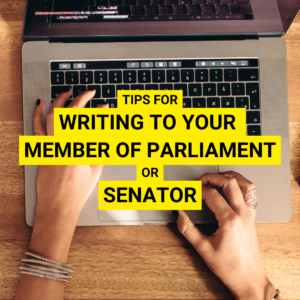Contacting your local Member of Parliament (MP) or a Senator will help strengthen the Veteran Community’s voice in Australia.
Our MPs and Senators are there to represent us, and in order to do that, they need to understand what your views are. The more an issue is raised with an MP or Senator, the more likely there will be action on that issue.
Emails are the simplest way to engage with your MP and your Senators.
MPs and Senators get hundreds of emails each day, and have a small staff to read and prioritise. Your goal is to have your email noticed. Here are some tips.
Who do I contact?
It is most effective to contact your local MP because as a constituent, your vote matters to them. You should also consider contacting your state’s Senators – there are 12 of them (or 2 if you are in the ACT or NT).
You can search for your local Member and your state Senator’s contact details here.
Or enter your postcode or electorate below (you will be taken to Parliament House search site):
What to write?
- Use the correct title
- Members of Parliament should be addressed “Dear Dr/Ms/Mrs/Mr Last Name” – e.g. Dear Dr Smith
- Senators should be addressed “Senator Last Name” – e.g. Dear Senator Smith
Keep it brief
- Your email should be as short and simple as possible. Stick to a single issue.
- If the issue is technical, keep your email short, but attach or link any additional documents that provides the extra information.
Introduce yourself and the issue you are writing about
- Start by introducing yourself and your issue.
- Include your name and address will show you live in their electorate – your local MP will pay more attention.
- A brief summary of the issue you are writing about.
My name is Jane Smith, I live at 123 Riverview Terrace, Clayfield.
I am writing to you about the Veterans Legislation Bill 2023 and particular provisions about funeral benefits.
Personalise the email
- Your objective is to stand out. Forwarding or cutting and pasting a form letter does not stand out. Using your own words and experience show that you have taken the time to write the email, which demonstrates that it is important to you.
- It is useful to:
- Include your personal experience with the issue
- Include relevant facts and figures
- Refer to recent news items on an issue
- Highlight a local connection to the issue
Be polite and avoid a negative tone
- Be polite and respectful, even if you disagree with a position the MP or Senator has taken on a particular issue.
What do you want them to do?
- Telling your MP or Senator how you feel about an issue is interesting, but you need to take that next step and tell them what you want them to do about it.
Please vote to amend the Veterans Superannuation Taxation Bill 2023 to make sure all veteran superannuation invalidity benefits should receive the same tax treatment provided by Douglas, regardless of which scheme or when payments commenced.
Follow up
- Finish your email saying you look forward to receiving their reply, and include the best way to contact you.
I look forward to your reply on this matter. My best contact is by replying to this email, or by phone on 0404 111 222.

